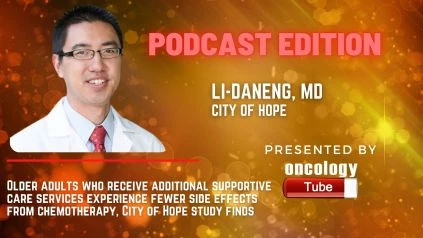Daneng Li, MD from the City of Hope speaks about Older adults who receive additional supportive care services experience fewer side effects from chemotherapy, City of Hope study finds.
Link to Article:
https://www.cityofhope.org/news/clinical-trial-over-65-chemotherapy
When a multidisciplinary team of experts analyzed each case and introduced personalized interventions, patients over 65 receiving chemotherapy experienced significantly fewer treatment-related side effects, according to a clinical trial led by researchers at City of Hope, a world-renowned cancer research and treatment organization.
Patients were offered additional supportive care services based on the findings of a cancer-specific geriatric assessment, a thorough instrument created by City of Hope in partnership with others that assesses physical abilities, co-existing health issues, nutrition, and mental health. The geriatric assessments were examined by a multidisciplinary group of experts, who recommended additional services to address the vulnerable areas of the experimental group.
In the study, 605 older adults were randomly assigned to one of two research arms: standard of care or geriatric assessment-driven intervention (GAIN), which included recommendations from specialists such as an oncologist, nurse practitioner, social worker, physical or occupational therapist, nutritionist, and pharmacist.
If the team identified nutrition concerns, such as significant weight loss, the patient was directed to a nutritionist for dietary guidance or an occupational therapist to help them improve their eating patterns in the GAIN arm. If the patient was taking a lot of medications, as many elderly people do, a pharmacist looked over the list and identified any prescriptions that should be avoided or replaced during chemotherapy. These types of changes based on particular patient demands could have played a role in the observed variances.
The researchers discovered that patients in the GAIN arm had fewer grade three or higher chemotherapy-related side effects (10%) than those in the control group, despite no significant differences in treatment changes or dose reductions. In addition, the experimental group completed 15 percent more advance directives than the control group, which outlines a patient’s desires if they become incapacitated. In terms of overall survival, there was no difference between the two arms.
This study focused on a group of people who are disproportionately afflicted by cancer, which is a disease of old age. According to William Dale, M.D., Ph.D., director of the Center for Cancer and Aging at the City of Hope and senior author of the study, adults 65 and older account for 60 percent of cancer diagnoses and 70 percent of cancer deaths.

